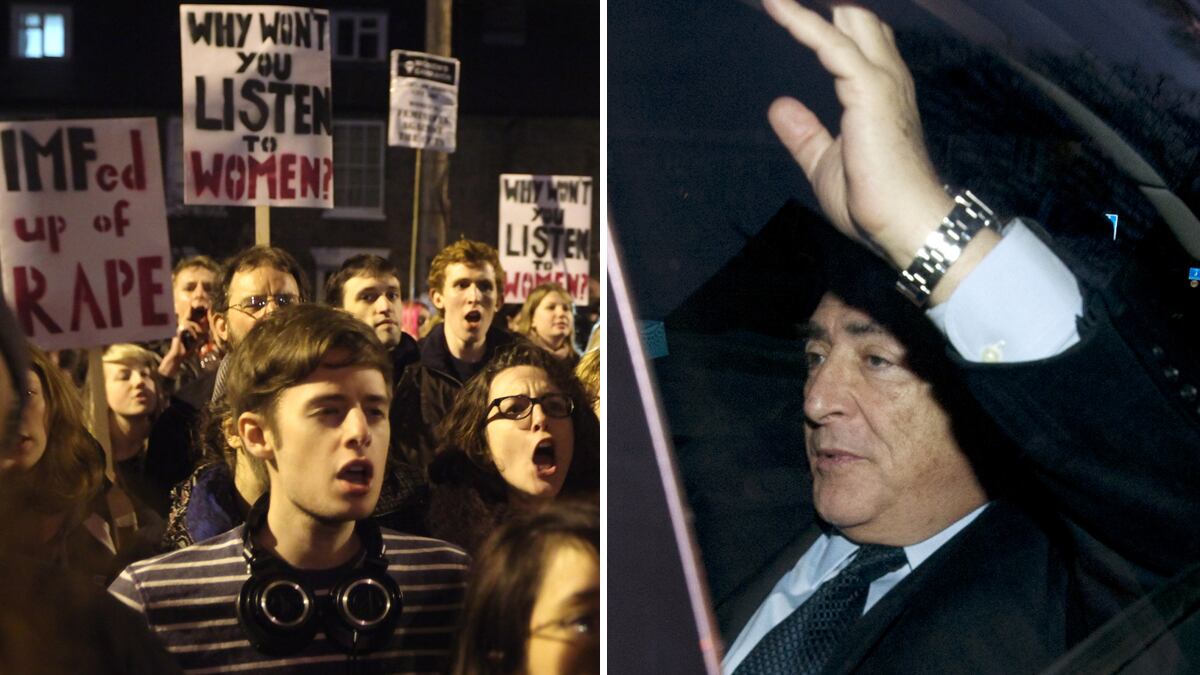Disgraced former International Monetary Fund chief Dominique Strauss-Kahn’s latest foray onto the international speaking circuit looked more like a circus Friday night at Cambridge University.
Ten months after the onetime French presidential-hopeful’s career collapsed in the space of a few minutes in the Times Square Sofitel’s suite 2806, his invitation by the Cambridge Union Society, the prestigious British institution’s 197-year-old debate club, to speak on the state of the global economy was met with angry protest. Two young people were arrested for vandalism—the no-need-for-translation “DSK DIE” spraypainted onto the Union’s building featured prominently in news reports in Strauss-Kahn’s native France—and two more during evening protests, one for assaulting a police officer, another for breaching the peace.
Chants of “DSK, go away!” could clearly be heard inside the heavily secured debating chamber as Strauss-Kahn spoke to students, deprived of mobile phones and recorders and subject to body searches, Cambridge’s own Varsity newspaper reported. Strauss-Kahn, a former professor in France, arrived through a side entrance and took his leave escorted—surreally, according to the Varsity—through a pizzeria.
Strauss-Kahn’s invitation had sparked a vocal “Disinvite DSK” initiative led by the Cambridge University Student Union’s Women’s Campaign, which gathered more than 750 signatures to a petition accusing debate organizers of “a callous desire to exploit gender crime allegations in the service of controversy.”

But the debating society, maintaining that its “purpose ... is to provide a neutral platform for free speech,” insisted its invitation predated Sofitel chambermaid Nafissatou Diallo’s criminal-sexual-assault claim, since dismissed in Manhattan, and that asking DSK to speak constituted neither endorsement nor disapproval. The club has hosted an eclectic range of speakers through its illustrious history, from Winston Churchill to Muammar Gaddafi (via satellite). “We feel Mr. Strauss-Kahn is exceptionally well qualified to speak on some of the most prominent international headlines of 2012, namely the global financial crisis and the French presidential election, and so we believe he will give a pertinent and interesting speech,” the Cambridge Union Society said in a statement.
The Women’s Campaign, meanwhile, retaliated by inviting Diallo’s New York counsel to speak separately on campus Friday. “For some strange reason Strauss-Khan believes he can go around the world and talk about the foreign debt crisis and the state of the European economy without being questioned about what he did to an innocent woman,” Douglas Wigdor told Cambridge students and assembled press Friday. The first hearing in Diallo’s civil case in the Bronx against Strauss-Kahn is scheduled for March 28, the same day he is due to face French magistrates investigating the prostitution and corruption case known as the Carlton Affair. In a move perhaps indicative of close ties between Diallo’s counsel and other Strauss-Kahn accusers ahead of her civil case, Wigdor read a statement from Tristane Banon, the French novelist who had accused Strauss-Kahn of attempting to rape her in 2003. Paris public prosecutors decided in October not to bring attempted-rape charges against Strauss-Kahn, but suggested he could have faced sexual-assault charges had that statute of limitations not expired in 2006.
Strauss-Kahn’s presentation inside the debating hall was barred to the media, with students left to leak proceedings to press stationed outside the venue. Strauss-Kahn is said to have been queried only once about his legal troubles, as one student asked the economist to explain Diallo’s “vaginal bruising the day after you met her.” British press reports of Strauss-Kahn’s brief response to the single question read like multiple choice, varying according to the leakee. The Telegraph quotes one, “I’m not quite sure that’s the topic of this evening. New York dismissed the case.” The Guardian quotes another, “The reality is I spent a week in prison and after a month and a half the case was dismissed. What do you want?” Cambridge’s Varsity published the longest alleged DSK response: “The District Attorney of New York as [sic] the prosecutor, and he decided to dismiss the case because he said the lady was lying. That’s it. After one and a half months, the district attorney wrote to me saying, ‘I’m sorry, we were wrong.’ And took another month to do the paperwork, and he dismissed the charges. So, what do you want?”
Nobody seems to have bothered to leak DSK’s thoughts on the state of the global economy. And that is perhaps, at the very least, the lesson the former professor Strauss-Kahn, and any other institutions considering inviting him to speak, will take away from his trip to Cambridge.






